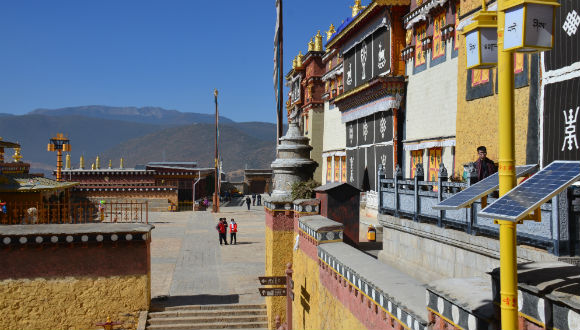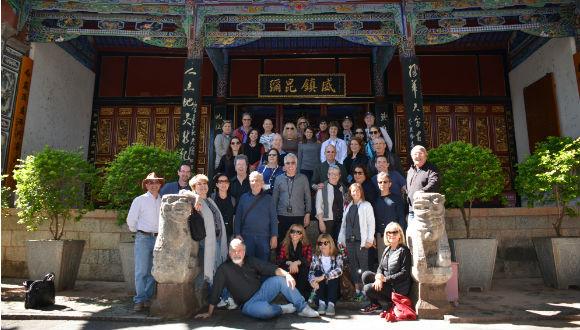Finding Shangri-La with Tel Aviv University
A large group of governors and supporters of Tel Aviv University from across the globe including Argentina, Australia, the United States, Canada, the UK, Luxembourg and Israel, joined a 9-day tour of China that focused on Beijing and Yunnan. The tour gave participants exclusive access to some of the cultural riches of China, while highlighting TAU’s growing connections with the superpower.
The group was accompanied throughout the expedition by TAU researchers Drs. Ori Sela and Asaf Goldschmidt of the Department of East Asian Studies, Lester and Sally Entin Faculty of Humanities. The two scholars shared their profound knowledge of China, its language, history, people and culture, enabling participants to gain a rich and multifaceted understanding of this fascinating, but still enigmatic, country.
Also representing TAU on the tour were TAU President Joseph Klafter, Rector Yaron Oz and Vice President for Resource Development Amos Elad, among other officials.
The opening cocktail reception and welcome dinner was attended by businessman, philanthropist and TAU Honorary Doctor Mr. Ronnie C. Chan, a committed advocate of TAU and champion of Israel-East Asia ties; Mr. Yuen Min-Jun, an eminent Chinese artist; senior officials of the Israeli Embassy in Beijing; Prof. Xue Hualing, former Chinese Academic Attaché in Israel; and the TAU delegation.
In his greetings, Prof. Klafter noted that TAU has the “biggest presence in China out of all the Israeli universities” and exceled in the research and teaching of Chinese and East Asian history, culture and society. “We are an Israeli academic superpower in China with links to 30 leading universities across the country,” he said. These include a partnership with Tsinghua University in Beijing, which has already led to the publication of breakthroughs in academia’s most prestigious journals; a joint Contemporary Israel Studies Institute in Shanghai; and the Nanjing executive education project for training 1,000 senior city managers at TAU in entrepreneurship and innovation.
Prof. Klafter noted that these agreements “tie in with TAU’s efforts and successes in getting Chinese businesses to pursue R&D with us, and to license new TAU technologies for commercialization.” He also noted the huge potential of TAU International’s English-language programs for the Chinese market.
Prof. Klafter praised Ronnie Chan for his “many activities on the University’s behalf, which include helping us with his vast network of contacts to open doors for TAU in China and also in Hong Kong.”
Private tour of the Forbidden City
Among the major highlights of the trip was an exclusive private tour of the Forbidden City in Beijing led by Chan, who is the co-founding director of the Forbidden City Cultural Heritage Conservation Foundation. The Forbidden City is closed to the public and will only open in 2020 to mark its 600th anniversary. The tour included Jianfu Palace Garden, Yangxin Dian (“The Hall of Mental Calculation”) and Zhongzheng Dian (“The Hall of Rectitude”).
 Tour of the Forbidden City led by TAU Honorary Doctor Ronnie C. Chan (pictured back, facing the group)
Tour of the Forbidden City led by TAU Honorary Doctor Ronnie C. Chan (pictured back, facing the group)
The group toured the Great Wall of China under the guidance of William Lindsay, an expert and author on the Great Wall and an activist for its preservation. In 1987, he spent 78 days hiking 1,553 miles from Jiayuguan Pass to Shanhaiguan Pass on the Great Wall, thus becoming the first foreigner to walk along the complete wall.
Also in Beijing, the group visited 798 – a complex of art galleries featuring avant-garde works. The connection with artists was organized by the founder of Yellow Mountain Contemporary Art, TAU supporter Ofer Levin; and facilitated by the Director of Yellow Mountain Dr. Gedaliah Afterman; Chief Curator at Tang Contemporary Art Wei Xing; and Platform Coordinator Wei Zhuo.
Leaving Beijing for the countryside in Yunnan province, located just south of the Tibetan Plateau, the group enjoyed breathtaking views of mountains, lakes and tribal villages. They explored the markets and enjoyed traditional dishes in the ancient city of Dali. They also visited an experimental farm under the guidance of Iranian Faraz Mani, who leads an NGO educating the Chinese on advances in agriculture. Mani is currently involved in developing innovative agricultural methods as a part of a broader vision of village-centered prosperity.
 Temple in Yunnan province
Temple in Yunnan province
Finding Shangri-La
The group toured Zhongdian, gateway to the Tibetan province of Kham and an important center for Yunnan’s Tibetan community. Located at an altitude of 3,200 meters and surrounded by snow-capped mountain peaks, primeval forests and lakes, Zhongdian was officially named “Shangri-La” after the mythical paradise. While in the area, the group visited the Dong Zhu Lin Monastery and Nunnery, where they viewed artistic treasures including masks and instruments, and witnessed a ritual debate on philosophical issues in Buddhism.
Other highlights of the trip included tai chi, kung fu and yoga lessons, as well as authentic local meals, a painting workshop and handicraft workshops.
Summing up the experience, TAU Vice President Amos Elad said, “This learning expedition created a close feeling of a community sharing a quest for knowledge together with a passion for TAU.”






